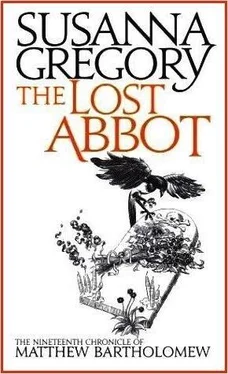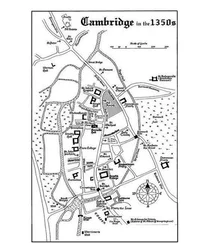‘She needs nothing of the kind,’ said Bartholomew, exasperated. ‘And I am not hankering after Julitta. She–’
He was interrupted by a bellow of manly laughter from Langelee, while the other Fellows exchanged amused glances – it was no secret that she was the first ‘patient’ the physician had called to see. Michael did not smile, though. He knew Matilde well enough to predict that she would succeed in the task she had set herself, at which point his friend would be faced with a difficult decision.
‘What happened to the treasure in the end?’ asked William, more interested in that than in Bartholomew’s tangled love life.
‘The defensores took most of it,’ replied Michael, glad, for Bartholomew’s sake, to be discussing something else. ‘But the rest will be used to build a new church in the marketplace. The abbey will oversee the work.’
‘And the monks can be trusted?’ asked Langelee doubtfully.
Michael nodded. ‘Yes, now Henry is Abbot.’
‘Henry,’ pounced Batholomew, a little triumphantly. ‘You were all wrong about him, and he is the man the Bishop chose to put Peterborough to rights.’
‘We were not wrong,’ countered Michael haughtily. ‘He is aggrevatingly pious, and he is said to have accepted the abbacy with gleeful glee. One of the monks wrote to tell me.’
‘He knows the Bishop will be watching his progress, so he will do an adequate job,’ said Clippesby, uncharacteristically harsh in his judgement. Bartholomew stared at him in surprise.
‘And should he falter, Ramseye and Yvo will keep him in order,’ added Michael. ‘They are far too bitter about their demotions to grant him any leeway. Peterborough will have a new church, of that I am certain.’
‘Does this mean you have decided not to try for the abbacy yourself?’ asked Langelee.
Michael sighed. ‘I cannot leave Cambridge as long as the trouble with Winwick Hall persists. My University needs me, so I shall stay. For now, at least.’
Bartholomew stood. It was getting late and he was tired.
‘You had better not be going to bed,’ said William rather accusingly. ‘Not before you have dressed the hand that I burned when I was fighting the fire in the abbey.’
‘And you have more patients who want to see you,’ added Langelee. He placed a list on the table. ‘They include Rougham of Gonville Hall, who says he will forgive you for failing his students at their disputations if you relieve him of a painfully ingrown toenail.’
‘And there are two new students who want to study medicine,’ said Cynric. ‘They are waiting for you in the hall. I told them to return tomorrow, but they refused.’
‘Do not stay out too late,’ warned Michael. ‘I need you to inspect that dead student at first light in the morning.’
‘Welcome home, Matt,’ said Clippesby with a wry smile. ‘It seems it is already business as usual.’
The abbey at Peterborough was founded by Mercian royalty in the 650s. The first church was destroyed in Viking raids, and was not rebuilt until the tenth century when the Benedictines arrived. They remained at Peterborough for almost six hundred years, raising the splendid church (started in 1116 when fire destroyed the old one) that still exists today. After the Dissolution, it was redesignated a cathedral, and visitors threading their way through the modern city are rewarded with the sight of one of the best Norman buildings in the world.
By the mid-fourteenth century, the monastery was one of the richest foundations in the country, although the Black Death hit it hard, reducing its sixty-four monks to thirty-two, even after laymen had been hastily tonsured in an effort to boost numbers. Its Abbot in 1358 was Robert de Ramseye, and a curious incident occurred during his tenure. It was in 1353, when John Gynewell, Bishop of Lincoln, absolved Hugh de Spalling from excommunication. According to the records, Spalling broke the locks on the abbey’s doors and gates, fished in its river without a licence, hunted in its woods and felled its trees.
Eight years later, Abbot Robert set off to visit the Papal Court in Avignon, and nothing more was ever heard of him. The monks lived in uncertainty until he was declared dead, which left them free to appoint a successor. This was Henry de Overton, who ruled the community for the next thirty years. Other Peterborough monks in the 1350s included John de Trentham, Thomas Appletre and Richard de Nonton; John de Welbyrn was appointed treasurer in 1351; and Walter was the cook. There was a cellarer in the 1400s named William de Ramseye, whom fellow monks did not like. He part-donated the eagle lectern that still stands in the cathedral, and he was buried in Peterborough after an ecclesiastical career spanning more than fifty years. There was a prior named Yvo in the thirteenth century.
As Peterborough Abbey had been founded by royalty, the King had the right to foist his old retainers on the community, and demand that they be kept for the rest of their lives, sometimes in considerable luxury. These were called corrodians, and one such man was John Lullington. He and his wife lived in style at abbey expense in the 1300s, and he had the right to dine with the abbey’s senior officers (obedientiaries).
The abbey had two hospitals. St Leonard’s was a foundation for lepers, although leprosy was all but gone from England by the 1350s, and it seems likely that it then became home to bedesmen, perhaps retired abbey servants. In return for bed and board, they recited prayers for the souls of benefactors. Its chapel was said to have had a healing well. In 1362, it had a ‘prior’ and eight residents. Bedesmen included John Inges, Roger Botilbrig, Philip Kirwell and Simon the cowherd. It was located on the outskirts of the town, on the road named Westgate.
The second hospital, dedicated to St Thomas Becket, was near the Abbey Gate. It is said that in 1176 a monk named Benedict was in a position to grab himself a few relics from Canterbury before travelling north to take up an appointment as Peterborough’s Abbot. These included flagstones from near where Becket was murdered, some of his clothes and vases of his blood. Benedict installed these in the chapel, where pilgrims visited them regularly. It seems that this community was run by women; inmates included Joan Sylle, Hagar Balfowre, Elene Bolton and Marion Raunsfeld.
A market was established outside the Abbey Gate, and not far away was the Swan Inn, mentioned in records dating back to 1338. The original Church of St John the Baptist lay to the east of the monastery, but the market probably caused some resettlement, and in the early 1400s a second church was built in the marketplace – one that still serves Peterborough today. Prominent townsmen in the fourteenth century included Hugh Pyk, Nicholas Piel, Ralph Aurifabro the goldsmith, and Reginald the cutler.
In the early 1300s, a criminal named Lawrence of Oxforde was hanged and buried in St Thomas’s churchyard. The authorities were appalled when miracles were said to have occurred at his grave, and quickly sought to suppress the tales. Several monks were excommunicated for encouraging people to visit the site, but the cult was clearly popular. Records show it took three visitations by the Bishop before the business was finally stamped out.












